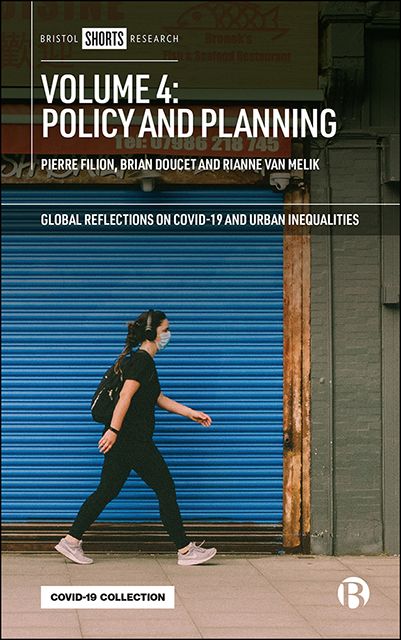Book contents
- Frontmatter
- Contents
- List of Figures and Tables
- Notes on Contributors
- Acknowledgments
- Preface to All Four Volumes of Global Reflections on COVID-19 and Urban Inequalities
- One Introduction: Policy Making in the Face of Uncertainty and Inequality
- Part I COVID-19 and Urban Changes
- Part II The Pandemic, Social Inequality, and Mobilization
- Part III Municipal and Urban Policy Responses
- Index
Three - Platform Labour in Urban Spaces after COVID-19
Published online by Cambridge University Press: 25 April 2023
- Frontmatter
- Contents
- List of Figures and Tables
- Notes on Contributors
- Acknowledgments
- Preface to All Four Volumes of Global Reflections on COVID-19 and Urban Inequalities
- One Introduction: Policy Making in the Face of Uncertainty and Inequality
- Part I COVID-19 and Urban Changes
- Part II The Pandemic, Social Inequality, and Mobilization
- Part III Municipal and Urban Policy Responses
- Index
Summary
Introduction
The COVID-19 pandemic, urban lockdown containment measures and national economic crises are impacting in a large way both urban spaces and platform labor. Cities are transforming the way to live in, while platforms are adapting to these new background conditions.
In this chapter we provide an overview on how platform labor was affected by COVID-19 and the implications this brings for urban planning and policies in the next months.1 We will make use of some results from the Horizon 2020 PLUS project (Platform Labour in Urban Spaces) investigating four main disruptive platforms (Uber, Airbnb, Helpling,2 and Deliveroo) in seven European cities (Barcelona, Berlin, Bologna, Lisbon, London, Paris, Tallinn).
First, we will introduce the effects of platform economy on labor and cities. Second, we will focus on specific case studies framed in a trans-urban comparison to highlight commonalities and differences in platform labor transformations and urban challenges. Finally, we will consider implications for urban policy, highlighting the potential role of local administrations in platforms’ management.
Platforms in contemporary capitalism
Platforms are ubiquitous in the contemporary world. In the time of the COVID-19 pandemic this is more apparent than ever. Just think of the use of such platforms like Zoom or Teams not only for work purposes but also to manage social relationships during the lockdown, and the expansion of appdriven food delivery, let alone the further entrenchment of the operations of an inventory giant like Amazon, which has become a full-fledged logistics company. The profits and stock market value of many platforms have consequently boomed in a spectacular way, and it is safe to predict that they will emerge from the current crisis as winners. Platform capitalism will continue to be a growing component of contemporary capitalism in the near future, although some platforms – notably the ones associated with the tourism industry and short-term rentals, like Airbnb – are clearly ravaged by the current reduced mobility. A reorganization of the world of platforms is underway and deserves close scrutiny.
What we call platform capitalism has a relatively short history. Its emergence is closely connected to another crisis, the financial crisis of 2007– 08.
- Type
- Chapter
- Information
- Volume 4: Policy and Planning , pp. 25 - 34Publisher: Bristol University PressPrint publication year: 2021



